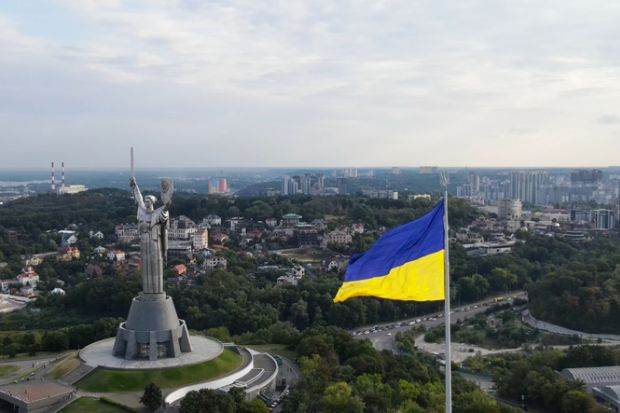As Russia’s tanks advanced on Ukrainian soil on three fronts, the message from university leaders in the country was clear: we refuse to panic.
With Russia beginning its ground offensive into Ukraine, shelling was heard in numerous Ukrainian cities in the east, along its coast and from its northern border with Belarus. Not long after, Ukraine’s president enacted martial law.
But while their country went to war, institutional heads were firmly focused on the task at hand, maintaining dialogue with their students and staff and ensuring that they got accurate, up-to-date information.
“We’ve got things under control,” said Vitaliy Kurylo, president of the Taras Shevchenko National University of Luhansk.
THE Campus views: Lessons learned teaching online, from wi-fi woes to war zones
Spread among five cities in Ukrainian-controlled territory, his university is no stranger to violent conflict. In 2014, Russia’s incursion into the now-occupied regions of Donetsk and Luhansk forced his university to relocate from its main campus.
A few days ago, in anticipation of a full-blown war, the institution evacuated its computers, important papers and official stamps.
“We already took them out of the territory of the university and the Luhansk region – we got ready for this situation though we hoped this wouldn’t happen,” Professor Kurylo said.
One of the largest universities in Ukraine, his institution has roughly 30,000 students, many of whom are at home this week due to a recent Covid-19 outbreak. “Thank God our students were learning digitally all last week,” he said.
Professor Kurylo credited the 2014 conflict with preparing his university for the pandemic and for the current invasion, noting that his institution was the first in Ukraine to adopt large-scale digital learning – something that will continue to serve it well.
Roman Grynyuk, rector at Donetsk National University, echoed the sentiment. In 2014, his institution was forced to relocate from Russian-occupied Donetsk when militants seized the campus, removing the Ukrainian flag from its main building and replacing it with a “hostile tricolour”.
“Because of the threat of physical violence and imprisonment, unwillingness to cooperate with terrorists and occupiers, a large number of teachers and students were forced to leave their hometown, their homes, parents, friends – some forever – within several hours provided by the ‘new government’,” he recalled.
Now in the central Ukrainian city of Vinnytsia, his university is drawing on its recent experience and resilience. It is also working to “counter fakes” in the news by disseminating up-to-date official information, for instance details from city authorities on nearby shelters.
Like his colleague, he echoed the need to remain calm. In a message to the university, he wrote: “Dear friends, in these difficult times, we must be aware that the enemy is trying to intimidate and make us panic. Our primary task is not to give the aggressor any chance to achieve these aims…the power of knowledge is crucial.”
Serhiy Kvit, head of Ukraine’s higher education quality assurance agency and newly elected rector of the National University of Kyiv-Mohyla Academy (NaUKMA), agreed.
“There is no panic, more or less everyone has the whole picture of what’s going on,” said Professor Kvit, who also teaches in the journalism faculty and researches Russian disinformation. He credited Ukraine’s media for its tireless “marathon” of coverage.
Asked whether he has needed to assure students to remain calm, he bristled: “I have never said don’t panic because it doesn’t make any sense. More or less everyone knows the full information about shelters…medicine, food and so on.”
Professor Kvit, who could hear shells exploding from his home in Kiev, said that in the event of war reaching his campus, NaUKMA has an agreement with a campus overseas to remove its important documents and books. But for now, he was squarely focused on his students.
On the morning of the invasion he cancelled operations at his university but nonetheless held classes with his students, so they could exchange thoughts about the situation.
“The main thing is, within our university we have a well-organised community, especially the student community, all of them have enough information on how to save themselves and what they should do in unpredictable circumstances,” he said.
Like his colleagues, Professor Kvit appealed to scholars and institutions overseas to support his country and “stand up with Ukraine against Putin’s regime”.
He called on universities, academic institutions in Europe and around the world to make their voices heard and petition their governments to act.
“You, our academic colleagues worldwide, can [and] should be heard with your clear and loud message of support to Ukraine.”
Already, it appears, that call is being heard. President of the German Rectors’ Conference, Peter-André Alt, pledged the support of German universities for their Ukrainian colleagues.
“This is a deeply depressing day,” he said. “Our solidarity applies to the entire Ukrainian population and above all our university partners. We are very concerned about the lives and well-being of Ukrainian scientists and students.”
And in Ukraine, while universities were making emergency plans, they were also looking to carry on with their work.
Professor Kurylo said he hoped his university could continue online classes from Monday, provided “there will be a connection and the opportunity”.
Inevitably though, for many students and some university faculty who are soldiers or reservists in Ukraine’s army – including those at Professor Kurylo’s institution – war will become their new reality.
“We pray that they’ll stay alive, that they’ll be victorious,” he said.




